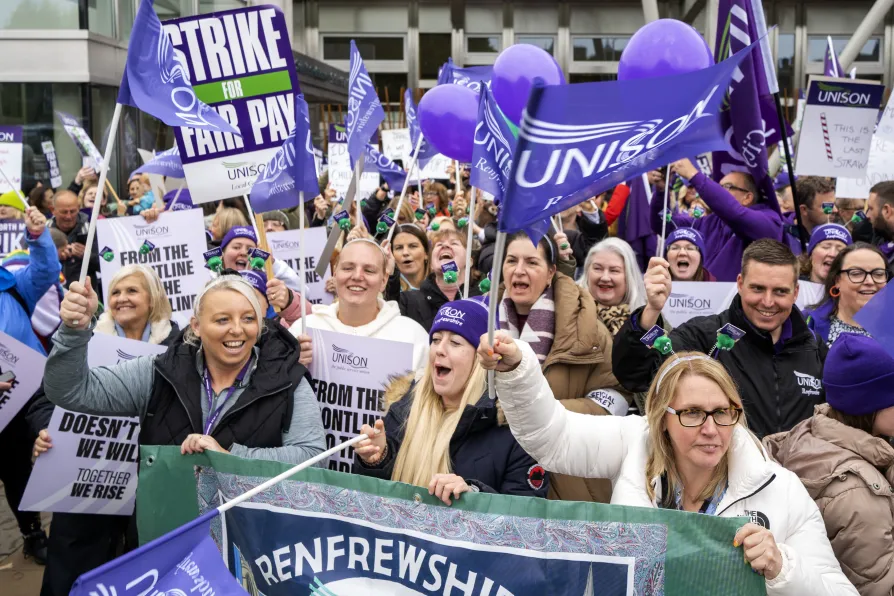Does widespread and uncontrolled use of AI change our relationship with scientific meaning? Or with each other? ask ROX MIDDLETON, LIAM SHAW and MIRIAM GAUNTLETT
Almost half of universities face deficits, merger mania is taking hold, and massive fee hikes that will lock out working-class students are on the horizon, write RUBEN BRETT, PAUL WHITEHOUSE and DAN GRACE

 School support staff members of Unison during a rally outside the Scottish parliament in Holyrood, Edinburgh, September 27, 2023
School support staff members of Unison during a rally outside the Scottish parliament in Holyrood, Edinburgh, September 27, 2023
WHEN we think of university staff, many will think of lecturers. They’re often the face of the sector, whether it’s in a lecture theatre or, increasingly, on a UCU picket line. However, at this week’s Unison national delegate conference, there is a small but not insignificant group of delegates from higher educational institutions.
In the complex landscape of HEI workplaces, we represent those who keep the university running so that lecturers can teach. Whether it’s working in the library, maintaining IT, supporting disabled students or staffing catering outlets across university campuses, our members are a diverse group working in many different roles.
Right now, our members’ livelihoods are under threat amid multiple converging crises, set in motion decades ago, that now threaten irreparable harm to the sector, destroying good, unionised jobs and the futures of young people. Forty-three per cent of HEIs are in deficit or expect to be by August, and at least 25 per cent are making redundancies with up to 10,000 jobs lost across the sector.
The merger of City University and St George’s Teaching Hospital in London has seen the first of what may be a new trend towards conglomeration of institutions, with corresponding reduction of staff and services. Similarly, within many HEIs, departments and schools are being merged with cuts to staff numbers and hours. Institutions claim they have no cash and need to find ways to cut costs or go bust.
Leaving aside the various vanity projects and specific cases of incompetence of some HEI executives, there is truth to this statement. The prospect of a university having to shut its doors due to lack of money seems increasingly probable. The funding model is broken, and there seems to be no political will to fix it.
After years of negligence and outright hostility from Tory governments, there was cautious optimism among some that with a Labour government, we might see a change of direction. However, the response of the new administration has been woeful. While there is always money for weapons of war, there is apparently none for our public services, and higher education comes at the bottom of the pile of public services.
Firstly, universities have been told to increase the recruitment of international students. Whatever the benefits our international students bring, dependence on them for income within the market system has exposed universities to increasing volatility, as visa conditions change and economies of students’ home countries evolve, sometimes very rapidly.
The same government has maintained the Tories’ ban on dependent visas for families of non-research students, with a particular impact on women from the global South and so on the courses where they predominate. Many courses and whole HEIs have long been reliant on increasing international student numbers to break even, and can no longer count on these increases.
Secondly, we are seeing an increase in tuition fees of £285 in England and Wales, taking the total yearly fee to £9,535, still not enough to cover the cost of educating a student, and immediately offset by the increase to employers’ National Insurance contributions. In Scotland, tuition remains free — for now. Universities UK, a lobby group of the chief executives of universities, argues that fees should represent course costs, meaning a hike to somewhere around £15-20,000 per year.
Combined with the crisis in further education, this would create an all but insurmountable barrier to young people from poorer backgrounds, deepening the divide between rich and poor and denying working-class youth the opportunity to fulfil their potential.
So what has our union been doing to fight these changes? For years, following failed national pay negotiations, branches across HEIs have taken part in disaggregated ballots to take action over below-inflation pay offers. The results have, on the whole, been dispiriting. This last round of negotiations saw only a tiny fraction of those balloted reaching the turnout threshold enforced by our draconian anti-union laws. The reasons for these poor results are varied, but there can be no doubt that it has failed as a strategy.
Unison’s policy is to oppose tuition fees. This is vital, but it’s only one piece of the puzzle. The conditions for an education policy that works for everyone in this country requires much broader changes and the political will to see them through; a well-planned industrial strategy that connects free education to good unionised jobs.
UCU’s conference raised the suggestion of a national dispute specifically targeting the funding model. The effectiveness of such an approach is debatable, but it is clear that our real fight is against the funding model and the market system itself. It’s a huge fight, and after years of the sector being slandered by Tory governments, not necessarily a popular one, but we have to win to save our universities and achieve free education for all.
Ruben Brett (Unison steward, University of Sussex), Paul Whitehouse (branch officer, LSE Unison and Greater London HE committee), Dan Grace (Unison steward at Sheffield Hallam).

JACK DAVIDSON explains the motivation behind the UCU strike action at the University of Sheffield












